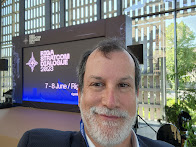One consistent theme throughout the visit thus far: "we told the West that Russia was aggressive and you didn't believe us--we were right." This is not just "I told you so," which, well, it is, but it is also, "hey, don't get smug, we are still in danger." So, the Latvians are definitely putting out that message strategically so that they get the help that they really believe that they will need.
I thought a good related message made by Latvia's President, Krišãjanis Kariņš, was that WWII generation and those who remember it may be passing from the scene, but those who lived through Communism and Totalitarianism are still very much around.
Graham Brookie, I believe, made the point in the second panel that to do Strat Comm well, you have to stand for something. This was a recurring theme as well. He also argued the battle was not between us and them controlling the info space but us fostering a free info environment. Talk to Elon Musk, I did not shout.
My favorite panel was the Masterclass by Ukraine, which the folks on the panel then spent much of the time discussing how Ukraine has done it well but not perfectly. Hanna Sheslet, who is a Ukrainian PhD working in a couple of different jobs--Director of Security Programmes at the Foreign Policy Council (No idea what that is) and editor-in-chief at Ukraine Analytica--was easily the best speaker of the day (the President was pretty good, too). She was clear, persuasive, and had great bits of data and stories. Among the things she said:- Narratives come back. You can't be satisfied with winning one battle against a specific narrative, as it will come back.
- We are winning but still in the middle of an info war.
- We need to be better about our language--saying it is the Ukrainian conflict allows Russia to avoid agency/responsibility. The passive voice (!) does the same--kids were kidnapped? No, Russia kidnapped the kids. She also used a Voldemort reference, so between that and the passive voice rant, she won me over.
- She was asked that since the democracy/autocracy thing didn't play in the Global South, why not try Russians as imperialists/colonial power (which, well, is true)? She responded that in her focus groups with folks from the Global South, they rejected that appeal for two reasons--that Ukrainians are white so they can't be victims of imperialism and that the Russians have inherited the Soviet mantle of being anti-imperial. Damn.
The panel also had a relatively less coherent speaker who also hit my sweet spot by showing NYT stories about the dam bursting (see, the passive voice denies agency, don't do this, kids) covering it with their favorite flavor--false equivalence sauce (been a long time since I have developed a new sauce!). Would you really want to be a journalist saying: hey, we gave the Jews five minutes, we need to give Hitler five?
Patrick James Christian, the third speaker on this panel, explained that there are some key ingredients to a successful strategic comms effort: reality, responsibility, right/wrong. Reality means that you have to speak to the basic facts and not deny them. Defeats happen, acknowledge them, don't pretty them up. Responsibility means emphasizing how everyone is responsible for each other--this ties people together and reduces despair. What is the right thing to do? Give guidance to what you want folks to do and not do. Help the people understand with meaning so they don't break.
I met a variety of folks during the various breaks including some of the NATO Field School people who will soon be sharing their experiences via the CDSN Podcast Network's new podcast--NATO Field Notes. The 45 students plus their leaders spent two weeks in Rome at the NATO Defense College and will be heading off to Brussels after two weeks here in Riga. They are getting some of the same briefings we did. It was good to see them. I also met a variety of other folks and got their impressions. The conference is in a neat space--a former railroad station. Overall, a very good first day of StratComm stuff. Tomorrow, one of our crew, JC Boucher, moderates a session so we will try to make things difficult for him.



No comments:
Post a Comment